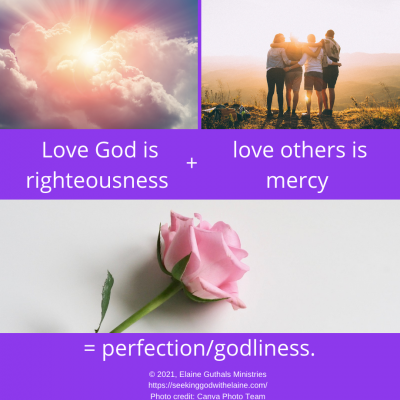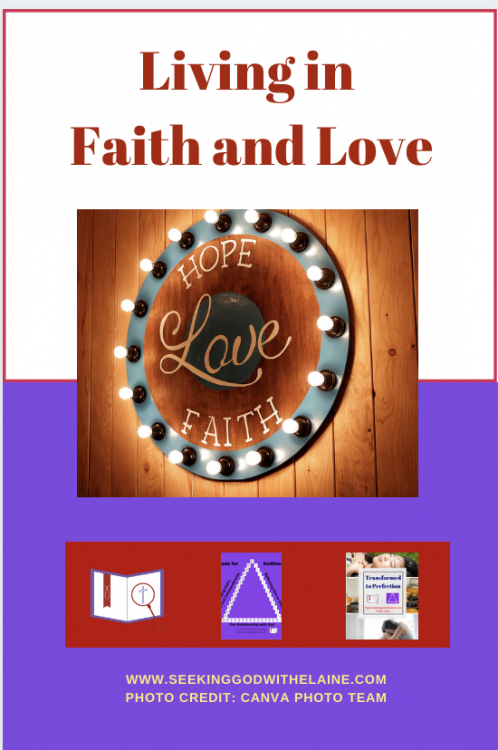Paul has been advising us to live in unity by choosing opposite choices than we would normally make so we not make fellow disciples stumble in their journey. This daily devotional continues to look at abstinence and discretion on indifferent things.
Nuggets
- It is our duty as a disciple to help our fellow disciples in their walks and not cause them to stumble.
- If God hasn’t expressly forbidden something, we should just keep our beliefs to ourselves on the indifferent items.
- Faith and sin are polar opposites.
To read devotions in the Redo for Godliness series, click the appropriate button below.
Devotions in the Transformed to Perfection series

Paul has been writing to the Romans about unity. He has been warning them that they shouldn’t presume their line of thinking is the only way. He has been tying this to eating.
There are three more verses to finish up the discussion. Paul is wrapping the discussion up to show them how to live in faith and love. Let’s dig in.
Let's Put It into Context #1
Here is a running list of what we’ve discussed previously.
But let’s hit the high points.
- There is only one standard but which we will all be judged.
- Something can be unclean to one person that is not unclean to another.
- We damage our good ourselves by the choices we make.
- We can influence our fellow disciples whether we intend to or not.
- Judgment can cause stumbling blocks to be put into place.
- God wants us to be genuine in serving Him.
To Abstain or not to Abstain
“It is a good thing not to eat meat, or drink wine, or do anything that makes your brother or sister stumble” (Rom. 14: 21 CSB)
It is our duty as a disciple to help our fellow disciples in their walks and not cause them to stumble.
We’ve been talking about the clean and unclean. Cleanness has to do with the Israelites remaining holy.
- Holy means to be set apart, perfect, and morally pure while possessing all virtues.
- Pure means not being sinful or having the stain of sin.
Glossary
We aren’t talking what God has declared a sin. Sins are actions by humans that disobey God and break one of His reasonable, holy, and righteous laws and commandments, goes against a purpose He has for us, or follows Satan’s promptings.
Glossary
If we stopped at the “It is a good thing not to eat meat … (Rom 14: 21 CSB), we might be okay. After that, we would probably be in trouble.
It can’t be “It is a good thing not to … drink wine …” (Rom. 14: 21 CSB). That would have made Jesus a sinner. We would be wrong there.
- “When the wine was gone, Jesus’ mother said to him, ‘They have no more wine’” (Jn. 2: 3 NIV).
- “The Son of Man came eating and drinking, and they say, ‘Look, a glutton and a drunkard, a friend of tax collectors and sinners!’ Yet wisdom is vindicated by her deeds” (Mt. 11: 19 CSB).
We can’t take things out of context. We have to read the whole verse in the whole passage. Doing things that were not forbidden but make others stumble is what is being discussed here.
Wakinshaw tied this to the second commandment: “… You shall love your neighbor as yourself …” (Mk. 12: 31 ESV).
Resource

It is the duty of every one of us to look out for every one of us. I am looking our for you. You are looking out for me. Thank you in advance.
That means, sometimes, I may have to give up doing something that I would do because it isn’t in your best interest — and vice versa. We do it willingly because we want each of us to stay strong in our faith in the Lord.
Hodge made a good point. Some things are unlawful only to some people. It was wrong for Samson to get his hair cut. I’ve had short hair. I now have — for me — Rapunzel hair. The length of my hair is not on God’s forbidden list.
Hodge went a little more in-depth in his explanation and a little less Disney. He wrote, “Some things are unlawful in their own nature, and can never be right. Others are wrong because forbidden, and only as long as the prohibition continues, and only to the parties concerned. Others are wrong on the ground of expediency, and therefore are sometimes wrong and sometimes right. It is not always easy to discriminate these classes.”
Resource
I know. Sends the checklist right out the window doesn’t it?
Well, Hodge did give us a mini checklist.
- Malice
- Envy
- Pride
Yes, those are checks in the evil category. We want to steer clear of those.
Let me process through some of the rules Hodge set down for things indifferent that are right or wrong according to the circumstances in which we find ourselves.
- Would harm come to others?
- Is it in any way accompanied with a sin?
- Would any important truth be denied in doing or not doing it?
Remember, not forbidden. Maybe even more important, these are not a condition of salvation.
Discretion on Indifferent Things
“Whatever you believe about these things, keep between yourself and God. Blessed is the one who does not condemn himself by what he approves” (Rom. 14: 22 CSB)
If God hasn’t expressly forbidden something, we should just keep our beliefs to ourselves on the indifferent items.
Note, this isn’t a get out of witnessing card. That is still in our job description. Go preach the gospel and make disciples
The Disciple’s Job Description
Complete Job Description
Individual Description
Job Duty #4
Proclaim the Gospel (Mark 16: 15)
Job Duty #6
Make Disciples (Matthew 28: 19-20)
There are a lot of people who believe a lot of different things. Simeon wrote that we each have to follow “… the dictates of his own conscience.”
We’ve talked about this before. We said if we can agree on the bottom line (which Spurgeon called essential doctrines), the others are subsequent to that. One essential doctrine is that we ABCD.
To read a related devotion, click the button below.
Resource
There is a saying, don’t sweat the small stuff. I think Paul would have liked it. I think he was saying keep the small stuff to yourself.
Simeon brought up our consciences, also. Our conscience is the part of our nature that impacts our moral decisions as it points us to what is right and gives us pain or pleasure depending on the choice.
Simeon described the conscience this way. He wrote, “Conscience prescribes no rules, but gives testimony to a rule before existing. Nor does any man ever commit sin by following its dictates.”
But our consciences have to be guided by God. We have to follow His Word and His Spirit instead of our own viewpoints.
Simeon noted that this obedience to conscience promoted peace. That is because we find favor with God when we look to Him.
It boils down to we don’t want to offend our fellow disciple. We are the family of God. We want to keep peace in the family.
No Room for Doubts
“But whoever doubts stands condemned if he eats, because his eating is not from faith, and everything that is not from faith is sin” (Rom. 14: 23 CSB)
Faith and sin are polar opposites.
Okay. The first part of the verse is confusing.
It is as the last part says. “… everything that is not from faith is sin” (Rom. 14: 23 CSB). Plain and simple.
Resource
It is hard not to doubt. My Ladies and I were talking a couple of Sundays ago. We don’t doubt that God can do something. There are times that we doubt that God will choose to do it in our lives at that specific time.
Webster noted that, for God to accept for works, they must be completed by His grace. That means they have to come from faith in Him.
Resource
I am not even going to try to look, but I know we talked about doing good deeds that just weren’t in God’s Will. He isn’t going to accept those.
We can’t run ahead of God. We can’t run behind Him. We have to stay instep with Him.

Making the Connections
Blackburn brought the discussion back to character. He wrote, “The Jewish converts were scrupulous concerning the use of certain meats and drinks, and lest they should be tempted to eat, and thus bring guilt on their conscience, the apostle persuades them, out of kindness to their brethren, to abstain. But we are asking you to regard moral character, for you are likely by moderate use of ardent spirits to form the habit that pollutes the soul of man.”
Resource
To me, this seems to be the assumed definition of abstinence. Don’t touch. Don’t think. Don’t look. Don’t talk.
Eve tried that with the one tree they couldn’t eat. Didn’t work out so well.
If we abstain from a vote, it is just from that one vote. It is not for every vote for the rest of our lives.
When I am in Word and I ask it to define abstinence, it says “restraining in indulgence.” It doesn’t say giving it up all together. It says don’t go overboard.
It says use self-control, which we know God likes.
God wants us to be in control. He wants us to be sober and even keeled.
Glossary
How Do We Apply This?
- Be mindful of the needs of others and be willing to meet those needs by willingly not doing something that isn’t forbidden.
- Practice self-control.
To me, this is another way we exercise our free will within God’s standards. We must allow others their free will.
Father God. We praise You for Your loving kindness. We thank You for loving us enough to redeem us. Help us to live in unity. Amen.
What do you think?
Leave me a comment below (about this or anything else) or head over to my Facebook group for some interactive discussion.
If you don’t understand something and would like further clarification, please contact me.
If you have not signed up for the email daily or weekly providing the link to the devotions and the newsletter, do so below.
If God has used this devotion to speak with you, consider sharing it on social media.